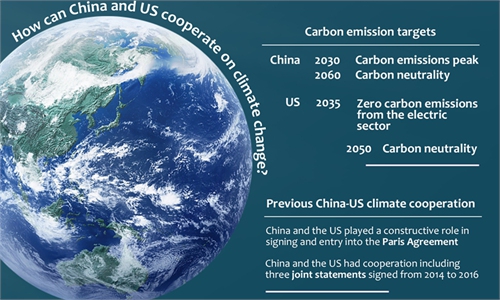
Illustration: Tang Tengfei/GT
Cooperation on tackling the climate crisis seems to have the potential to become the biggest common denominator among China, the US and the EU.
China and the US are committed to cooperating on restricting climate change, the two countries said in a joint statement, following a meeting between China's climate envoy Xie Zhenhua and his US counterpart John Kerry in Shanghai over the weekend.
Against the backdrop of a strained China-US relationship, the statement could be seen as a basis for restarting bilateral climate talks, indicating that there may still be many other issues like climate change in the global arena that require cooperation between the two major economies.
And, during a video summit held on Friday, top leaders from China, France and Germany also reached an important consensus to strengthen their cooperation to reduce carbon emissions and prevent climate change.
Dealing with the climate crisis has become a top priority calling for closer global cooperation, not only between China and the EU, but also between China and the US, because all countries, big or small, are stakeholders in the globe's efforts to cut emissions and save our common living home - the beautiful Earth.
Putting aside political and trade spats among the world's major economies, it is widely hoped all countries can continue to find their common ground to strengthen cooperation.
At present, the issue of climate change is undoubtedly one of the most pressing and significant when it comes to the future of the planet. According to predictions from the scientists, global warming needs to be limited to 1.5 degrees Celsius above pre-industrial levels, or the consequences could be disastrous for human civilization.
Since cooperation on climate change requires the participation of all counties, such a joint push toward the same goal will also bring huge opportunities for economic and green technology cooperation.
The carbon neutrality goal will only be achieved through a revolution of green energy technologies. And during the process, economies that have advantages in finance, technology, talent, and research shoulder the responsibility to help enhance coordinated development in all other countries and regions to vigorously promote green farming and industrial production, and in leading a wave of clean energy revolution.
Accomplishing carbon neutrality also calls for huge sums of investment. Take China as an example. China has pledged to reach peak emissions before 2030 and achieve carbon neutrality by 2060.
To reach the goal, the country would need to continue to enhance public awareness of a greener development, upgrade its economic structure, and speed up construction of a greener industrial chain, based on new technologies.
At a joint seminar with the IMF on Thursday, China's central bank governor Yi Gang said that the carbon neutrality endeavor will cost the country about 2.2 trillion yuan annually through 2030, and about 3.9 trillion yuan annually over the next three decades until 2060, which means China's green push will also bring great opportunities for both Chinese and overseas businesses.



